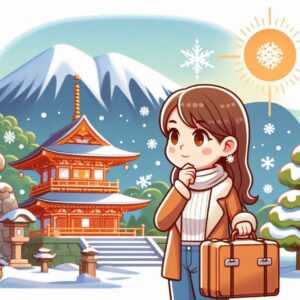Welcome Blessings!
(Tap 🔽 to see more topics!)


Table of Contents
ToggleIf you’ve ever wondered what living in Japan is like, it’s an adventure. I remember when I first arrived here a few years ago, filled with excitement, curiosity, and dreams of experiencing the beautiful culture, rich history, and delicious food that Japan is known for. But let me tell you, living in Japan is nothing like what you expect from a tourist’s perspective. Living here as a foreigner brought challenges I hadn’t fully anticipated. As much as I had researched, nothing prepared me for the day-to-day experience of being a foreigner in this admirable country.
Living in Japan is like stepping into a dream- beautiful landscapes, ancient temples, cherry blossoms, and bustling cities filled with neon lights. It sounds magical… and it is! But it’s also like peeling an onion. The more layers you uncover, the more complex and nuanced it becomes. Some layers might make you cry (hello, culture shock), but others will reveal a sweetness and richness you never expected.
The first few years of living here were a whirlwind of emotions, challenges, and cultural shocks. But despite all the struggles, every challenge was a valuable lesson that shaped me into the person I am today. The beauty of living in Japan is that it offers opportunities for personal growth in ways you never imagined. Whether it’s learning how to go through the language barriers, overcoming cultural differences, or finding a way to survive harsh winters and high living costs, the lessons keep coming, and each one makes you stronger and more resilient.
If you’re considering working or living in Japan or are already here and wondering how to thrive, let me share the lessons I’ve learned. It may differ from others’ experiences, but you can pick what is helpful for you and leave the rest.
Let’s start with the elephant in the room: the language barrier. Imagine studying for a test, feeling confident, and then walking into the exam room only to realize none of the questions match what you learned. That’s exactly how I felt when I arrived in Japan. Before coming here, I had studied simple or basic conversational Japanese— like how to order food, ask for directions, and even introduce myself. But then reality hit! People spoke fast, used slang, and layered their sentences with cultural nuances. It felt like trying to swim upstream without knowing how to float.
There’s nothing like trying to converse with a native speaker, especially when they speak at lightning speed, using phrases and idioms you’ve never heard before. I quickly realized that while studying Japanese in textbooks was helpful, it didn’t prepare me for the reality of living in Japan. Japanese isn’t just a matter of memorizing vocabulary… it’s about understanding the nuances of grammar, pronunciation, and writing systems that vastly differ from what I was used to.
One of the most eye-opening moments for me was realizing that, despite studying, I couldn’t engage in a real conversation without struggling. The first time I tried to explain myself in Japanese, I felt like a little kid again, stumbling over my words, unsure if my words made sense. And don’t even get me started on reading kanji! That’s a whole new level of difficulty.
I remember trying to talk to a local shopkeeper, and when I spoke, I could tell I wasn’t being understood. I had to resort to using gestures and repeating myself multiple times. It was humbling, to say the least. I was well-prepared, but speaking a new language was more challenging than expected. But here’s the silver lining… this struggle was where my growth began. I had to learn to embrace mistakes. I had to let go of my fear of judgment in any area of life. I realized that in Japan, language was as much about connecting with others as it was about communication.
Let me tell you about one of my favorite little adventures in Japan- going to a ramen shop after work. After a long day of teaching, I’d treat myself to this cozy spot down the street. The smell of the rich, savory broth hits me the moment I step in, and it’s like my whole body says, Yes, this is what I need! It’s one of my ways of unwinding: warm ramen and a quiet corner.

But then comes the hilarious and a little nerve-wracking part… the menu. It’s all in kanji, and I mean all (sometimes with no images)! There is not a single English word at sight or in the pictures. During my first few months, I didn’t have a stable internet connection with my mobile so I couldn’t use Google Translate. So, I’d sit staring at it as if squinting harder or making my eyes bigger might magically make me understand. I couldn’t tell if I was ordering pork ramen, vegetarian ramen, or some mystery dish. So, what do I do? I point at a random item on the menu, cross my fingers, and hope for the best!
When the bowl arrives, I feel excitement and slight terror- what did I order? Sometimes, it’s what I wanted… other times, I’ve had a few surprises. Once, I ended up with something so unfamiliar I spent a full minute poking at it, wondering if I was supposed to eat it with chopsticks or embrace my confusion. These moments, though, make the language barrier both frustrating and oddly fun!
How I Learned to Handle It
The language barrier is tricky, no doubt about it. It mixes awkward moments, wild guesses, and small victories. But honestly, it’s also where some of the best memories are. Life in Japan hands you these little puzzles… whenever you solve one, you feel more confident and connected. And trust me, every misstep is just part of the adventure!
Early on, I learned that the Japanese are incredibly patient with foreigners trying to speak their language. Sometimes, I felt embarrassed for not knowing the right word or misunderstanding something. But every time I stumbled, people around me offered encouragement and support. Over time, I developed the confidence to speak more, even if I wasn’t perfect. The more I tried, the better I got.
I still make mistakes, but don’t let them hold me back. I understand that language learning is a marathon, not a sprint. So, if you plan on living in Japan, don’t be discouraged by the language barrier. It’s part of the experience, and in many ways, it’s one of the most rewarding challenges you’ll face. Embrace it, and watch your confidence grow with each conversation you have.
Living in Japan is like stepping into an entirely different world. Even though I had done some research before moving here, so many cultural differences still surprised me. One of the first things that hit me was the concept of hierarchy and the importance of respect in every interaction.
I quickly learned that how you speak to someone depends significantly on their age, position, and social status. I had to be extra careful about using formal language, addressing people with the appropriate titles, and even bowing in the right way. The bowing thing? It’s a whole art form here, and believe me, there were several awkward moments when I didn’t get it right. But over time, I became accustomed to expectations, which made me realize how much effort people put into respecting each other. It’s not just about being polite; it’s about honoring each individual’s place in the hierarchy.
Beyond work, I also noticed how this hierarchy extended into everyday life. For example, when you greet someone, you don’t just say “hello.” The way you greet them can vary depending on their age or status. I remember the first time I met a senior manager at my first workplace. I was unsure how to greet her properly. Should I bow lower? Should I speak in a more formal tone? It was initially overwhelming, but I quickly learned that understanding the cultural context of interactions was essential to living in Japan.
Another cultural shock for me was Japan’s emphasis on punctuality. In my home country, being a bit late wasn’t a huge deal. But in Japan? You better be on time, or you might not show up at all. However, over time, I started to see the value of punctuality. It’s a sign of respect for other people’s time and a reflection of Japan’s broader commitment to order and structure. If you show up late, it’s not just about you being late; it affects everyone else.
The culture of silence was another element I had to adjust to. In Japan, people tend to avoid speaking loudly in public; sometimes, it’s even seen as rude. There’s an unwritten rule that you should keep conversations at a low volume, especially in places like trains or restaurants. As someone from a culture where conversations can get loud and animated, I found it difficult to adjust initially. I felt held back during group outings because I wasn’t used to the quieter, more restrained communication style. But over time, I realized how this more silent, more reflective approach contributes to a more peaceful and harmonious society.
Living in Japan taught me to appreciate the subtlety and nuance in every interaction. Even the smallest gesture can carry significant meaning. In many ways, Japan taught me that genuine connection goes beyond words; it’s in the energy, respect, and thoughtfulness you bring to your relationships.
Here is something I didn’t expect when I moved to Japan- the harsh cold winters. I had always lived in warmer climates, so the first winter I spent here in Nagano was a massive shock to my system. Nagano is famous for its heavy snow, and let me tell you, it’s not just a light dusting like you see in movies. It’s thick, relentless snow that covers everything in sight.
The first winter was brutal because I wasn’t used to the cold. I found myself constantly bundled up in layers, and still, it felt like the cold seeped right through to my bones. It wasn’t just the snow but the relentless chill in the air and the dark, short days. I remember feeling isolated, wishing for the sunny days I was used to.

But you know what? I learned to adapt over time, like the language struggles and cultural shocks. I invested in better clothing and heaters, embraced the beauty of snow-covered landscapes, and even learned to enjoy the cold. There’s something magical about watching the mountains blanketed in white snow. Once I started looking at it from a different perspective, I began to appreciate the winter season as a time for quiet reflection and personal growth.
Living in a place with harsh winters also taught me resilience. Yes, the cold was brutal at first, but the challenge of surviving the winter months made me stronger, and I learned how to embrace the challenges life throws my way. I learned how to overcome the problematic, snowy roads and the importance of maintaining a positive attitude even when everything seemed bleak. The winters here are harsh (it depends on your location), but they taught me to find warmth even in the coldest of times and how to push through challenging seasons.
Another challenge that hit me hard was Japan’s high cost of living. Everything seemed expensive, from rent to groceries to utility bills, compared to what I was used to back home. When I first moved here, I was shocked at how much I was paying to survive. In cities like Tokyo or even Nagano, rent can eat up a large chunk of your salary, and the cost of necessities can add up quickly.
At first, I struggled to make ends meet. Sometimes, I had to live on a very tight budget, skipping meals with friends or avoiding certain expenses to stay afloat. I even tightened my belt too much to save money to send to my family and some friends, asking or borrowing money and buying simple souvenirs for my relatives and friends. And let’s not even talk about the bills- the utilities, the insurance, the taxes (you do your research) it all felt overwhelming!
But as time passed, I learned to manage my finances in a way that worked for me. I got better at budgeting (I’m still learning), saying “no” when needed, figuring out where to cut costs, and finding ways to live more frugally without sacrificing my needs. I also became more aware of the difference between wants and needs, between people who are only taking advantage and people who are really in need.
The high cost of living forced me to learn to prioritize what matters most and become more resourceful and better at managing money, time, and energy. It was a wake-up call to be more mindful of how I spent my energy, time, attention, and hard-earned money. I believe that God always provides and is always with us, and there is nothing to worry about as long as we trust in Him and do not stop trying and doing our best.

Looking back, these struggles, have played a significant role in my growth. In a way, these challenges have shaped me into a more resilient and adaptable person. The cultural shocks enhanced my patience and respect for the values of others. The language barrier pushed me to become more persistent and humble. The cold winters showed me the power of resilience, while the cost of living made me more financially savvy and mindful of my priorities.
It hasn’t always been easy because some people misunderstood me in every adjustment and change I made. But I believe that as long as God knows that I am not harming anyone, I’ll keep learning through every struggle. And I wouldn’t trade those lessons for anything.
If you’re considering moving to Japan or facing challenges, my advice is simple: Don’t give up. Embrace the journey because your challenges will help you grow in ways you never imagined. Living in Japan has been one of the most transformative experiences of my life, and I know it can be the same for you. Every struggle is an opportunity to become a better version of yourself. So, take the leap, trust in the process, and most importantly, trust God and yourself.
Thanks for reading. I hope these experiences inspire you to make the most of your adventure in Japan. Voila! I’ll see you at the next one!
Arlene Tangcangco, Ph.D. candidate (タンカンコ道地ア-リ-ン) also known as Teacher AL, is a learner and teacher at heart. Driven by curiosity, she has explored various fields since she was 17. She was a working student who held multiple jobs as a Tutor, Customer Service, and Sales Associate while studying full-time. After graduation, she worked as a Junior Radio Reporter, Team Leader, HR Recruitment and Training Officer, College Instructor, and Permanent Public Secondary School Teacher.
She has also jetted off to Japan to teach conversational, business, and academic English to various learners while furthering her education. AL's motto is "Learn to teach, and teach to learn." She believes education is a lifelong process that enriches one's mind, heart, and soul.
We use cookies and similar technologies to improve your experience by processing data like browsing behavior and device info. If you don’t consent, some features may not work properly.
